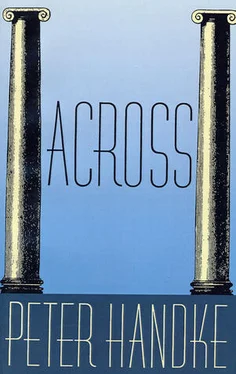Peter Handke - Across
Здесь есть возможность читать онлайн «Peter Handke - Across» весь текст электронной книги совершенно бесплатно (целиком полную версию без сокращений). В некоторых случаях можно слушать аудио, скачать через торрент в формате fb2 и присутствует краткое содержание. Год выпуска: 2000, Издательство: Farrar, Straus and Giroux, Жанр: Современная проза, на английском языке. Описание произведения, (предисловие) а так же отзывы посетителей доступны на портале библиотеки ЛибКат.
- Название:Across
- Автор:
- Издательство:Farrar, Straus and Giroux
- Жанр:
- Год:2000
- ISBN:нет данных
- Рейтинг книги:3 / 5. Голосов: 1
-
Избранное:Добавить в избранное
- Отзывы:
-
Ваша оценка:
- 60
- 1
- 2
- 3
- 4
- 5
Across: краткое содержание, описание и аннотация
Предлагаем к чтению аннотацию, описание, краткое содержание или предисловие (зависит от того, что написал сам автор книги «Across»). Если вы не нашли необходимую информацию о книге — напишите в комментариях, мы постараемся отыскать её.
Across — читать онлайн бесплатно полную книгу (весь текст) целиком
Ниже представлен текст книги, разбитый по страницам. Система сохранения места последней прочитанной страницы, позволяет с удобством читать онлайн бесплатно книгу «Across», без необходимости каждый раз заново искать на чём Вы остановились. Поставьте закладку, и сможете в любой момент перейти на страницу, на которой закончили чтение.
Интервал:
Закладка:
His listeners also recalled things that had happened long ago. When one stopped, another took over, and the result was a single story in many voices.
“Sitting on the doorstep had a Sunday, end-of-the-day quality. A duty had been done and now you were resting. When passersby saw someone sitting this way on his doorstep, they became friendly. He was in his right place. Once, when some bigger children were chasing me with sticks, I didn’t run into the house, I waited for them on the threshold; they greeted me and nodded as if nothing had happened. Some thresholds were very high; in crossing them, you lifted your knees and bumped your head on the doorframe. Sitting on the threshold meant that the door could not be closed. Of course there wasn’t much you could do; at the most, blow soap bubbles or read, propping your heels and shoulders on the doorframe. The women would set a chair on the threshold and sit there with their knitting. I often used to stand on the threshold, watching a storm and letting the raindrops or a stray hailstone graze me. Once, when my grandmother had an attack of asthma, she ran out of the house and stood on the threshold screaming with terror and gagging (in the end, her screams were no more than squeaks). Some mornings, there were dead mice and birds’ feathers on the threshold, matted with blobs of innards. At spring-cleaning time, the thresholds got a thorough scrubbing; warm steam rose up from them, they showed their original pattern and smelled good. At Whitsuntide the thresholds were made festive with birch saplings on either side. I thought the threshold of my parents’ room was especially high. Strange signs were incised in the threshold of the house next door; it had formerly been a tombstone. The village wisdom had it that in case of earthquake you should not run out into the open but stand on the threshold under the doorframe; there you were safe. For me, ‘threshold’ evoked ‘ripping up’; because it was always the wood of the threshold that was first attacked by mold and that had to be replaced most frequently. Thresholds are noticed only in the country; in the city, they are forgotten. The most beautiful threshold I’ve ever seen was a natural creation, the entrance to a stalactite cave; it was a compact, luminous slab, perfectly rounded, an additional glassy-white floor among floors. The most beautiful threshold I ever saw was a kitchen threshold, covered with linoleum and riddled with thumbtacks; after a day of talk, I had come home to palpable things; the threshold is my place, I thought, and there I stood. Standing outside a closed door as a child, I would shout ‘Stupid pup!’ instead of ‘Open up!’ And similarly, at the threshold of the forest, I’d shout ‘Stupid pup!’ before going in. Bird tracks on the snow-covered threshold. What is the opposite of threshold phobia? Fringe benefit.”
The others turned to the questioner. Had he wanted to “test” us? He replied: “No, not test, just make you tell stories. You see, I’ve noticed that there’s no better way of getting people to tell stories than to ask them about thresholds.” In the enthusiasm of our storytelling, we even interrupted the son of the house, who was still on the telephone, to ask him what he thought a threshold was. He answered succinctly: “A nuisance!” and sank back into his telephone corner.
One after another fell silent. But this was not the usual lull in the conversation before a group breaks up. The storytelling seemed, rather, to continue in the silence, and thus to become more eloquent than ever. Each of us delved deeper into himself and there met his neighbor, with whom he now, without trying, had everything in common. “Once upon a time there was we.” (How is it that I can say “we”? After all, we were not very many. And I trusted this “we.” Once upon a time there was a fact.) One burst out laughing, seemingly out of a clear sky, and another nodded; or one drew a line through a ring of wine on the table, and his neighbor added to it.
We had stopped drinking; our host forgot to pour more wine and the guests forgot to empty their glasses. Cigars went out and so did pipes. A smell of quinces drifted in; and, from outside, puffs of snowy air. Our host stopped being a host; from then on, he was merely one of the several persons who had met “somewhere.”
We all sat straight in our chairs, as though backrests were no longer needed. Were we waiting for something? No, the event — the story — had already happened. In the embers of the dying fire, our collective eye discerned a glittering nocturnal metropolis filled with roaring, flashing, and crashing, with relays of light and shadow running from end to end; sometimes sparks shot across it like ambulances. Strange how the gaze sinks into fire, whereas it usually bounces back from flowing water.
We were not waiting; yet someone was still missing. We didn’t know it until the lady of the house, just back from somewhere, appeared in a festive midnight-blue coat and boots shaped like birds’ beaks, and sat down nonchalantly in our midst. She completed the circle. Beside her the men looked unshaven, and beside them the woman’s face, shaded by a broad-brimmed hat, betrayed a fatigue that was a kind of happiness. Something had moved her (a musical phrase? the snowy night?). Quite naturally, she took part in the silent, all-disentangling exchange of stories. In the midst of the warm room, her coat gave off cold; the snow crystals on it, interlocking at first, softened visibly into drops of water. A daddy longlegs ran into our field of vision, its little round body duplicated by the shadow under it. Outside the window, a screech owl, so close it might have been perched on the windowsill, let out a catlike screech. The house next door became visible, a yellow wall covered by a wisteria vine, its arm-thick stem coiled and tangled like a display of sailor’s knots. A birch stood white in the darkness, its hanging switches moved only by the falling snow, only one branch vibrating in the void; a bird must have just landed on it. A yew tree grew star-shaped out of the ground, its star-shaped needles pointing like a road sign to the arch in the hollow, which framed the sparse but brightly twinkling lights on the plain below.
We separated outside the house, where the road branches off in different directions. The snow along the edges (it had melted everywhere else, except in the half-rolled leaves of a box tree, the whole of which it transformed into a snowy beacon) heightened the “crossroads” image. Each went his own way. Our host walked backward through the front garden to the house. His wife stood upstairs in the open window, looking out beyond us; her charm was of the kind that made one dream and not stare. For a moment, the house — the lantern affixed to the outside wall made you think of a farmyard at night — seemed to be part of a mountain village.
Instead of heading across the plain on my way home, I turned into a street so narrow that no one could have walked beside me. This street describes a loop which, after a steep hill, leads to the main road to the Old City. A phone rang in a house on the hill just once, as if it were a signal. I wanted to be alone with the falling snow. As I went downhill, something drew me upward, but to a much higher mountain, above the tree line; in my thoughts I saw myself on the crest of the Untersberg at night, between bare limestone cliffs, with nothing on my mind but the next step and the next handhold: “wholly present!”
Down at the intersection I ran into the painter, who was deep in contemplation of a cleft in the rock that was covered by a climbing plant — not just covered, but completely filled with it; he was holding a heavy robe of tight-meshed blossoms, blue through and through, bedded and framed in leaves. In the blowing, melting, then freezing snow the blue had the color of an old glacier; the flowery train was its tongue. When I looked longer, the blue seemed to stand out against it, and an expression often heard at digs came to my mind: “You must find the edges.” The painter swung the plant-robe and called out to me: “How merry are colors in motion!” And: “There are colors everywhere!” And: “Colors need to act!”
Читать дальшеИнтервал:
Закладка:
Похожие книги на «Across»
Представляем Вашему вниманию похожие книги на «Across» списком для выбора. Мы отобрали схожую по названию и смыслу литературу в надежде предоставить читателям больше вариантов отыскать новые, интересные, ещё непрочитанные произведения.
Обсуждение, отзывы о книге «Across» и просто собственные мнения читателей. Оставьте ваши комментарии, напишите, что Вы думаете о произведении, его смысле или главных героях. Укажите что конкретно понравилось, а что нет, и почему Вы так считаете.












